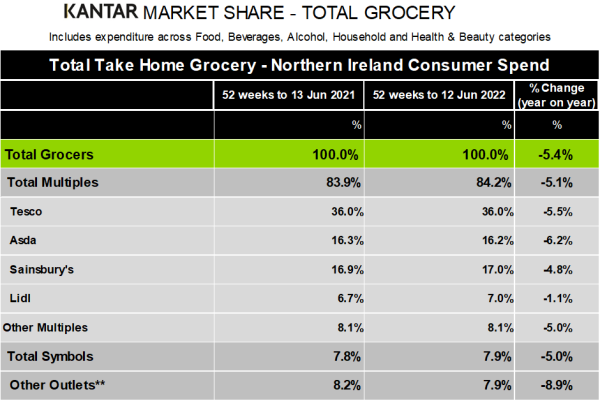Grocery sales in Northern Ireland dipped by 5.4% in the year to 12 June, partly due to people eating fewer meals at home are they returned to offices, schools, and restaurants following the pandemic. However, the data from Kantar confirms that accelerating inflation is also making its mark on how people in the region shop.
Emer Healy, senior retail analyst at Kantar, commented: “As shoppers return to pre-pandemic routines, we’re seeing people visit the grocers little and often. Baskets and trollies are getting smaller, with the volume of products purchased per trip declining by 10.4% over the past 12 weeks. People are heading out to the shops more frequently though, and the number of visits to the supermarket is up 2.8% over the past three months. In another nod to normality, take-home alcohol sales have dropped by 13.7% as people opt to get out of the house and head to their local pub for a drink or two instead.”
As with the rest of the UK, rising inflation is having an impact on consumer behaviour. Kantar’s data shows that grocery prices in Northern Ireland are up 4.2% over the year, an increase of 0.6 percentage points from last month. “People will unsurprisingly be sticking close to those grocers which can offer the most competitive promotions in an effort to manage increasing costs,” said Healy.
Sales at all of Northern Ireland’s major retailers have slowed compared with the highs of last year. Lidl was the best performer, with the smallest decline among all the grocers and increased its market share by 0.3 percentage points. Tesco maintained its position at the top of the table with a 36.0% share, whilst there was little change for Asda (16.2%) and Sainsbury’s (17.0%).

NAM Implications:
- Consumers are patently measuring their purchases more carefully…
- …thereby reducing waste.
- Add the uncertainties re the NI Protocol to other market turmoil…
- …as an indicator that this situation is not going to improve soon.
- Watch this space!



